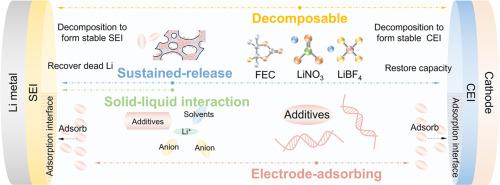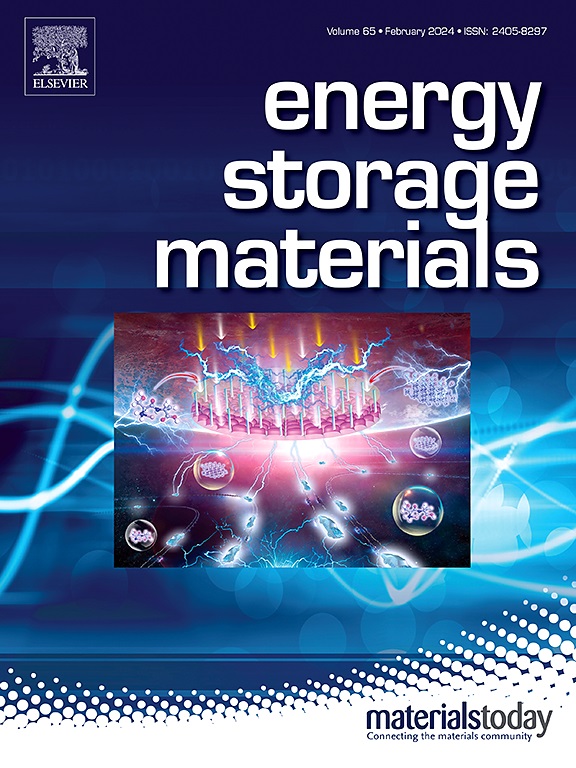Additive-Induced Interfacial Chemistry: The Key to Next-Generation Lithium Metal Batteries
IF 20.2
1区 材料科学
Q1 CHEMISTRY, PHYSICAL
引用次数: 0
Abstract
The practical deployment of high-energy-density lithium metal batteries is critically hindered by their poor cycling stability, stemming from inherent electrode/electrolyte interfacial instability. Addressing this challenge requires strategic electrolyte design to stabilize electrode interfaces (that is, solid-electrolyte interphase) and suppress parasitic side reactions. Among the most promising approaches, electrolyte additives stand out by selectively modifying interfacial chemistry through in-situ chemical or electrochemical reactions, effectively prolonging battery lifespan without compromising energy density. This review transcends conventional classification by chemical composition or phase, proposing a mechanism-based framework that categorizes additives as decomposable, suspension, sustained-release, and electrode-adsorbing functional chemical regulators. By addressing practical challenges, it systematically elucidates how molecular structures and physicochemical properties govern interfacial reactions and electrochemical performance, particularly their interactions with bulk/interface chemistries. Furthermore, it offers forward-looking strategies emphasizing synergistic integration of interfacial engineering and data-driven approaches like artificial intelligence to predict molecular reactivity and interfacial efficiency. These insights deepen fundamental understanding of additive mechanisms, accelerating the design of next-generation additives through tailored liquid/interface chemistry for stable high-performance lithium metal batteries.

添加剂诱导界面化学:下一代锂金属电池的关键
由于固有的电极/电解质界面不稳定性,高能量密度锂金属电池的循环稳定性较差,严重阻碍了其实际部署。解决这一挑战需要战略性的电解质设计来稳定电极界面(即固体-电解质界面)并抑制寄生副反应。在最有前途的方法中,电解质添加剂通过原位化学或电化学反应选择性地改变界面化学,有效延长电池寿命而不影响能量密度,从而脱颖而出。这篇综述超越了传统的化学成分或相分类,提出了一个基于机制的框架,将添加剂分类为可分解、悬浮、缓释和电极吸附的功能化学调节剂。通过解决实际挑战,它系统地阐明了分子结构和物理化学性质如何控制界面反应和电化学性能,特别是它们与体/界面化学的相互作用。此外,它还提供了前瞻性策略,强调界面工程和数据驱动方法(如人工智能)的协同集成,以预测分子反应性和界面效率。这些见解加深了对添加剂机理的基本理解,通过量身定制的液体/界面化学,加速了下一代添加剂的设计,以实现稳定的高性能锂金属电池。
本文章由计算机程序翻译,如有差异,请以英文原文为准。
求助全文
约1分钟内获得全文
求助全文
来源期刊

Energy Storage Materials
Materials Science-General Materials Science
CiteScore
33.00
自引率
5.90%
发文量
652
审稿时长
27 days
期刊介绍:
Energy Storage Materials is a global interdisciplinary journal dedicated to sharing scientific and technological advancements in materials and devices for advanced energy storage and related energy conversion, such as in metal-O2 batteries. The journal features comprehensive research articles, including full papers and short communications, as well as authoritative feature articles and reviews by leading experts in the field.
Energy Storage Materials covers a wide range of topics, including the synthesis, fabrication, structure, properties, performance, and technological applications of energy storage materials. Additionally, the journal explores strategies, policies, and developments in the field of energy storage materials and devices for sustainable energy.
Published papers are selected based on their scientific and technological significance, their ability to provide valuable new knowledge, and their relevance to the international research community.
 求助内容:
求助内容: 应助结果提醒方式:
应助结果提醒方式:


